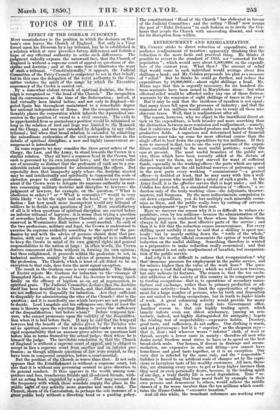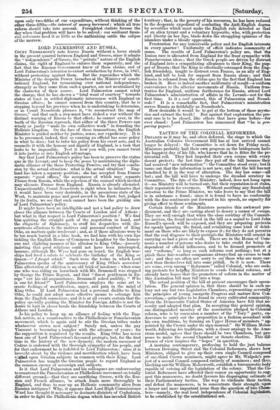RETRENCHMENT AND REORGANIZATION.
MIL COBDEN sticks to direct reduction of expenditure, and re- pudiates readjustment of taxation ; apparently thinking that the reduction is the more facile and practical thing. He thinks it possible to revert to the standard of DM, not "corrected for the population " ; which would save about 5,500,0001. on the expendi- ture of the current year. What then ? The amount of relief that would come to each individual would average about five
a head ; and Mr. Cobden propounds his plan as a measure shillings But he thinks he could go further, and reduce the expenditure by 10,000,0001.—about eight shillings a head. -Mr. Hume says that this is urgently necessary, for six hundred dis- tress-warrants have been issued in Ifarylebone alone : but what effectual relief would be afforded under any one of those distress- warrants by the remission of eight shillings of taxes in the year ?
But it may be said that the incidence of taxation is not equal ; that many, taxes fall upon the processes of industry; and that the remission of ten millions would enable you to remit all those mis- chievous taxes. Well, that is readjustment after all. The reason, however, why we object to the inartifieial direct at- tack on the expenditure, is both broader and more searching than the distinction between mere remission and readjustment,—namely, that it cultivates the field of limited produce and neglects the truly productive fields. A sagacious and determined band of financial reformers must take up some far more effectual course than the single effort to beat down the expenditure by ten millions. If they were to succeed in that, ten to one the very portions of the expen- diture curtailed would be the most useful portions ; exactly the ease at present. The most useful branches of the public ser- vice, those which have been recently added at the dictate of distinct want for them, are kept starved for want of sufficient funds, especially in the working offices : the parts which are spared the pruning-knife are the old habitual reserves of patronage ; and in the new parts every working "commissioner '—a genteel officer—is doubled at least, that he may carry with him a well- connected person who would like a salary of such a grade. • In the Army itself, it is the elective service that is kept under; and Mr. Cobden has detected, in a simulated reduction of "officers," a re- duction only of the truly working class—the Adjutants, Quarter- Masters, and Surgeons. By the mere indiscriminate compulsion to cut down expenditure, you do but multiply such miserable eeono- niies as these, and the publics really loses by cutting off servants whose employment "pays-" for their cost. Here we uncover one reason why it is so difficult to reduce ex- penditure, even by ten millions—because the administration of the reducing process is conducted by those whose bias inclines them always to fall upon the most effective parts of the service ; and then it is felt that the reduction causes inconvenience. For every shilling spent usefully it may be said that a shilling is spent use- lessly: but by merely cutting down the "tattle of the whole," you leave the worthy official economists the option of working the reduction on the useful shilling. Something therefore is wanted as preparative to make reduction really economical ; and that thing wanted is not only readjustment of taxation, but reorganiza- tion of the public service.
And. why is it so difficult to enforce that reorganization ? why that ; immense pressure for employment in the public service, and for salaries higher than the value of the work done The ques- tion opens a vast field of inquiry; which we will not now traverse, but only indicate its features. The reason is, that the too exclu- sive addiction of the society of this country in its eompacter parts to trading occupations—that is, to operations of secondary manu- facture and exchange, rather than to primary production or ad- venturous activity—tends to limit the opportunities of employ- Ment for a large number of persons, who by birth and disposition are not suited to trading occupations, but in truth to higher kinds of work. A great colonizing activity would provide for many quick spirits ; as it is, they rush into Government office. Another reason is, that our highly trading spirit, which largely infests even our oldest aristocracy, among an aris- tocracy, indeed, not highly distinguished for antiquity,) begets the trading test of respectability—expensive habits. Decency, gtood taste, and sufficiency, do not suffice. Our clothing is warm, and not picturesque ; but it is "superior," as the shopman says— that is, dear ; and whoever wears " inferior " cloth, of wool or thread, accepts a lower caste in society : therefore all men who desire social freedom must strive to have or to spend on the best broad-cloth scale. Our houses, if decent in drainage and accom- modation, are expensive in site and fitting—you cannot have homeliness and good taste together, or it is an exception. Our very diet is infected by the same rule, and the " respectable " butcher is forced to an artificial scale of charges set by the capri- cious or luxurious taste of his wealthy customers. All men, there- fore, are straining every nerve to get or keep higher incomes than they need or even personally desire, because in the trading spirit of our day, a truly thrifty life is social degradation. True " re- formers," in mending that huge moral fault by example in their own persons and demeanour to others, would relieve the middle classes of a far worse incubus than the ten millions which consti- tutes the Hume-Cobden "excessive taxation."
And all this while, the trenchant reformers are working away
upon only two-fifths of our expenditure, without thinking of the other three-fifths—the interest of money borrowed; which all true reform should take into account Farsighted statists foresee the day when that problem will have to be solved : our soidisant finan- cial reformers heed it as little as the unthinking cattle the eclipse of the morrow.



























 Previous page
Previous page